Related Research Articles

Glen Travis Campbell was an American country singer, guitarist, songwriter, and actor. He was best known for a series of hit songs in the 1960s and 1970s, and for hosting The Glen Campbell Goodtime Hour on CBS television from 1969 until 1972. He released 64 albums in a career that spanned five decades, selling over 45 million records worldwide, including twelve gold albums, four platinum albums, and one double-platinum album.
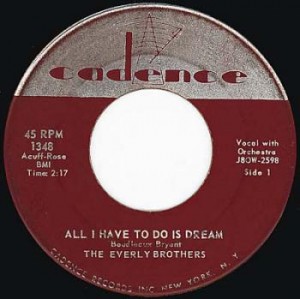
"All I Have to Do Is Dream" is a song made famous by the Everly Brothers, written by Boudleaux Bryant of the husband-and-wife songwriting team Felice and Boudleaux Bryant, and published in 1958. The song is ranked No. 141 on the Rolling Stone magazine's list of The 500 Greatest Songs of All Time. The song is in AABA form.
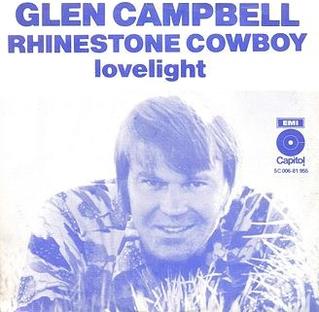
"Rhinestone Cowboy" is a song written by Larry Weiss and recorded by American country music singer Glen Campbell. When released on May 26, 1975, as the lead single and title track from his album Rhinestone Cowboy, it enjoyed huge popularity with both country and pop audiences.

"It's Only Make Believe" is a song written by drummer Jack Nance and Mississippi-born singer Conway Twitty, while they were touring across Ontario, Canada in 1958. Twitty was a relatively unknown rock n' roll singer at the time, and this song was his first hit, reaching No. 1 on the 'Billboard chart in November 1958 for two weeks.

"Let It Be Me" is a popular song originally published in French in 1955 as "Je t'appartiens" interpreted by Gilbert Bécaud. It became popular worldwide with an English version by the Everly Brothers and later with the duet by Betty Everett and Jerry Butler.
"I Remember You" is a popular song, published in 1941. The music was written by Victor Schertzinger, with lyrics by Johnny Mercer. The song was originally recorded by Jimmy Dorsey in 1941. It has since been covered most notably by Frank Ifield, Glen Campbell, Björk and George Michael.
"By the Time I Get to Phoenix" is a song written by Jimmy Webb. Originally recorded by Johnny Rivers in 1965, it was reinterpreted by American country music singer Glen Campbell on his album of the same name. Released on Capitol Records in 1967, Campbell's version topped RPM's Canada Country Tracks, reached number two on Billboard's Hot Country Singles chart, and won two awards at the 10th Annual Grammys. Broadcast Music, Inc. (BMI) named it the third most performed song from 1940 to 1990. The song was ranked number 20 on BMI's Top 100 Songs of the Century. Frank Sinatra called it "the greatest torch song ever written." It was No. 450 on Rolling Stone magazine's Top 500 Songs of All Time.
"Highwayman" is a song written by American singer-songwriter Jimmy Webb about a soul with incarnations in four different places in time and history: as a highwayman, a sailor, a construction worker on the Hoover Dam, and finally as a captain of a starship. The song was influenced by the real-life hanged highwayman Jonathan Wild. Webb first recorded the song on his album El Mirage, released in May 1977. The following year, Glen Campbell recorded his version on his 1979 album Highwayman.

"Southern Nights" is a song written and performed by American musician Allen Toussaint, from his 1975 album, Southern Nights, and later recorded by American country music singer Glen Campbell. It was the first single released from Campbell's 1977 album, Southern Nights, and reached No. 1 on three separate US charts.

"Galveston" is a song written by Jimmy Webb and popularized by American country music singer Glen Campbell who recorded it with the instrumental backing of members of The Wrecking Crew. In 2003, this song ranked number 8 in CMT's 100 Greatest Songs in Country Music. Campbell's version of the song also went to number 1 on the country music charts. On other charts, "Galveston" went to number 4 on the Billboard Hot 100 and number one on the "Easy Listening" charts. It was certified gold by the RIAA in October 1969.
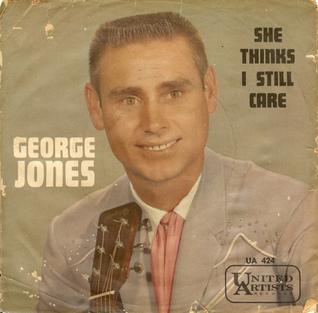
"She Thinks I Still Care" is a country song written by Dickey Lee and Steve Duffy. The song was recorded by multiple artists, including George Jones, Connie Francis, Anne Murray, Elvis Presley and Patty Loveless.
"I Wanna Live" is a song written by John D. Loudermilk and recorded by American country music singer Glen Campbell. It was released in March 1968 as the lead single from the album, Hey Little One. The song was Campbell's sixth release on the country charts and his first of five number ones on the country chart. The song spent three non-consecutive weeks at number one and a total of fifteen weeks on the country charts. The song was also Glen Campbell's third Top 40 release peaking at number thirty-six.

"Country Boy " is a song written by Dennis Lambert and Brian Potter, and recorded by American country music singer Glen Campbell. It was released in October 1975 as the second and final single from the album, Rhinestone Cowboy.
"Bonaparte's Retreat" is the name of two related songs. The original was a wordless melody that existed as various fiddle tunes dating back to at least the late 1800s and probably well before that. In 1950, American country music artist Pee Wee King recorded a modified version of the song, with lyrics added, which he also called "Bonaparte's Retreat". This latter song has been covered by many country artists.
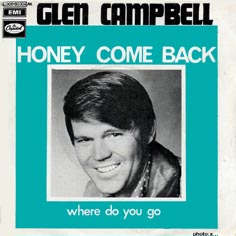
"Honey Come Back" is a song written by Jimmy Webb, and recorded by the American country music artist Glen Campbell. It would become a major hit for him.

"Dreams of the Everyday Housewife" is a song written by Chris Gantry and recorded by American country music artist Glen Campbell. It was released in July 1968 as the first single from his album Wichita Lineman. The song peaked at number 3 on the Billboard Hot Country Singles chart. It also reached number 1 on the RPM Country Tracks chart in Canada.
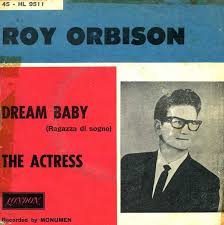
"Dream Baby (How Long Must I Dream)" is a song written by Cindy Walker which was first recorded and released by Roy Orbison originally as a non-album single in 1962. It was a big international hit for Orbison, reaching number 2 in both the Australian and the UK singles charts and number 4 in the U.S. Billboard. It was also a top ten hit in Canada and Norway. Five months later, "Dream Baby" was included on Orbison's Greatest Hits compilation LP.
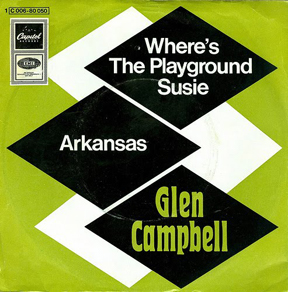
"Where's the Playground Susie" is a song written by Jimmy Webb and recorded by American country music singer Glen Campbell. It was released in April 1969 as the second single from the album Galveston. The song peaked at number 26 on the Hot 100, number 28 on the U.S. Billboard Hot Country Singles chart, and number 8 on the Canadian RPM Top Singles chart.
"The Last Time I Saw Her" is a song written and recorded by Canadian singer-songwriter Gordon Lightfoot and released in 1968. It was also recorded by American country music artist Glen Campbell, whose version was released in June 1971 as the second single from his album of the same name, The Last Time I Saw Her. Campbell’s version peaked at number 21 on both the U.S. Billboard Hot Country Singles chart and the RPM Country Tracks chart in Canada. Lightfoot had recorded the song for his 1968 album Did She Mention My Name?. Other artists who have recorded the song include Harry Belafonte, John Arpin, Johnny Mathis, Andy Williams, and Keola & Kapono Beamer. In 1974, a Finnish version, "Sun Piirtees Vielä Nään", was recorded by Tapio Heinonen for his album Lämmöllä.
"Manhattan, Kansas" is a song written by Joe Allen, and recorded by American country music artist Glen Campbell and released in March 1972 as a single. The song peaked at number 6 on both the U.S. Billboard Hot Country Singles chart and the RPM Country Tracks chart in Canada.
References
- ↑ Whitburn, Joel (2004). The Billboard Book Of Top 40 Country Hits: 1944-2006, Second edition. Record Research. p. 67.
- ↑ "Glen Campbell Chart History (Hot Country Songs)". Billboard.
- ↑ "Hot Country Songs – Year-End 1988". Billboard. Retrieved July 5, 2021.